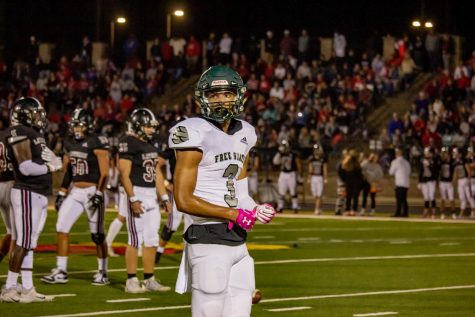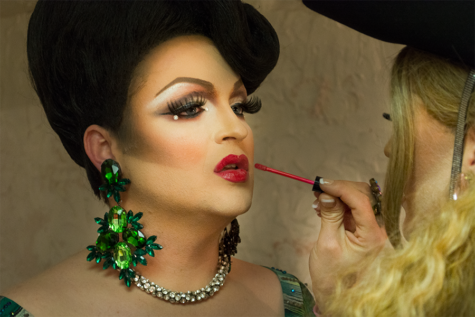Single-gender English 9 classes result in ACLU intervention
At the beginning of the semester, the administration divided two freshman English classes into three single-gender classes. In January, the ACLU questioned the change, and the classes were promptly rearranged to be coeducational. “It [was] kind of different, I know that, but it [was] fun because it [was] with my friends and everything,” freshman Tannner Cobb said.
When freshman Aidan Dietz entered their seventh hour English 9 classroom on the first day of second semester, they were met with confused stares from their classmates.
“At first people were looking at me like, ‘What the heck is wrong? There’s a chick in our class,’” Dietz said. “But they just kind of rolled with it.”
This English 9 class was one of three single-gender classes offered briefly at the start of January, two all-male and one all-female. After the Kansas American Civil Liberties Union (ACLU) sent a letter to Superintendent Dr. Rick Doll questioning the legality of dividing students by gender and requesting such division be discontinued, the classes were rearranged to be coeducational.
The ACLU cited Title IX, United States v. Virginia and guidelines issued by the Department of Education’s Office of Civil Rights as reasons for the request.
While Dietz identifies with both the male and female genders, they asked their counselor to be in the all-male class and prefer it to the current coeducational arrangement.
“I felt kinda less like I was being judged [in the single-gender class],” Dietz said. “… Not all girls, but some can just be really snobby and rude—just like guys can be snobby and rude, but they don’t make you feel really insecure about it.”
In their letter, the ACLU noted that in order to provide a single-gender class, under Department of Education regulations, participation must be voluntary and with parental consent.
While students in the classes were not told about the single-gender arrangement before the semester began, Dietz learned of it when, in December, they noticed a difference in their second semester schedule.
The classes, which were not a district-wide initiative, sought to help freshman students excel in the English classroom by cutting out the distraction the administration believed the opposite gender might have.
In an interview on Jan. 5, a day before classes resumed for second semester, Principal Ed West noted that his research and prior experience showed both genders could benefit from single-gender classes, although girls would benefit more.
West also cited interest differences between genders as reason for the split.
“… The types of things that students are interested in are more gender-specific than what we might think,” West said. “Whether it be long novels, fiction, nonfiction, short stories, those types of things, as well as just the level of conversation that you can have is different between males and females.”
Because the idea originated at the school level, Doll had no prior knowledge of the single-gendered classes before he received the ACLU’s request.
“That was an initiative that was specific to Free State, kind of a neat idea, but no, I didn’t know about it,” Doll said. “I got to know about it after we received a complaint.”
Although counselors began rearranging schedules to create coeducational classes after the release of the ACLU’s letter, many of the male students involved, including freshman Avant Edwards, agree that the single-gender setting was a good experience.
“I prefer all boys, probably because we just do boy stuff in the class, instead of having to worry about the girls being there,” Edwards said.
Research, however, appears to show no advantage to a single-gender set up. In their letter, the ACLU cited a meta-analysis of over 1.6 million students conducted by the American Psychological Association, which “showed that, when proper controls are used, there are no benefits to single-sex education.”
Without the presence of females in the classroom, content was taught with examples focused on topics specific to helping the boys connect with what they were learning.
Edwards described the class as more physical, noting an activity where students went around the classroom to posters and wrote down people, places or things that deserved respect.
Dietz also felt that the class was more active than their previous English classes.
“Mr. (Brandon) Wolak would choose things that were more what a lot of guys are in to,” Dietz said. “Like, talking about football and stuff, but in an English context.”
Freshman Gage Collins preferred the all-boys class because he felt more focused there than he did in his coeducational classes.
“I don’t get distracted,” Collins said.
With the hasty shifting of students, some freshmen cited the newly coeducational classes as “quieter,” and most said they preferred the prior arrangement.
Dietz, however, is indifferent.
“I just, I mean, I really don’t care,” Dietz said. “It’s more about the people than the gender. Like, I like people’s personalities, and some personalities I don’t like. It’s not like it’s specific to male and female.”




![After receiving advice from her students, orchestra director Judy Erpelding marks her music. Although the director normally makes the artistic decisions, Erpelding will often consult her students and hear their opinions on what sounds good and what they should try out. “[The students] are the heart of the program, not me,” Erpelding said. “I know they will carry that on and I will miss them. Making great music with them, being able to challenge them, taking their inspiration.”](https://www.fsfreepressonline.com/wp-content/uploads/2023/05/Roust_Erpelding_5_11_23-317x475.jpg)










